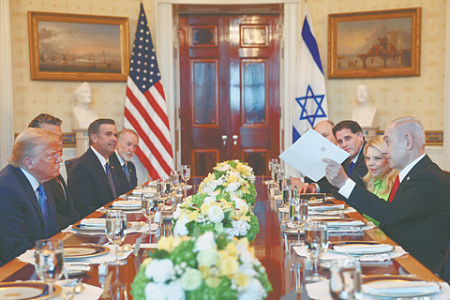
In the tense aftermath of a major military campaign against Iran, a rift is emerging between the United States and Israel over the future of the conflict. During high-stakes talks at the White House, Israeli Prime Minister Benjamin Netanyahu reportedly sought tacit approval from President Donald Trump for potential new military strikes, signaling that Israel does not consider the threat from Tehran to be neutralized. This push for a continued hardline stance contrasts sharply with a more cautious American position, setting the stage for a potential clash between the close allies.
Israeli officials believe the 12-day war, despite damaging Iran’s nuclear infrastructure, was not a final blow. The primary concern within Netanyahu’s government is that Iran will immediately work to rebuild its capabilities, potentially by attempting to salvage highly enriched uranium from the debris of bombed research centers in Fordo, Natanz, and Isfahan. According to sources, Israeli strategists are already gaming out new military scenarios, emboldened by assessments that the Trump administration would not ultimately oppose another wave of attacks if deemed necessary by Jerusalem.
However, President Trump has projected a different outlook, expressing hope that Iran now desires peace and signaling that Washington is not currently contemplating a repeat attack. This diplomatic hesitancy is underpinned by a stark military reality. A report in The Guardian, citing sources familiar with Pentagon data, revealed that the recent joint operation significantly depleted US munitions. The Pentagon’s ‘global ammunition counter’ is said to be at its lowest point in three years, presenting a formidable logistical obstacle to any sustained new campaign.
From Tehran, the signals have been deliberately ambiguous. While the Iranian Foreign Ministry has firmly rejected the idea of direct talks with American diplomats, President Masoud Pezeshkian has struck a more conciliatory tone. In a recent interview, he stated a willingness to negotiate international oversight of the nuclear program but added a crucial caveat: the “illegal attacks” by the US and Israel have severely damaged the facilities, rendering access and verification currently impossible. This statement simultaneously blames the West for the impasse while buying Tehran valuable time.
Analysts suggest Iran may be exploiting the crisis to pivot towards a policy of “nuclear ambiguity,” a strategy long employed by Israel itself. This would involve covertly advancing its nuclear potential to a breakout capability while maintaining a public posture of denial. Such a move would fundamentally reshape the region’s security landscape, allowing Iran to operate on the nuclear threshold without formally declaring itself a nuclear power, thereby complicating international responses.
Expert analysis further suggests that the impact of the US-Israeli strikes may be more limited than presumed. While surface infrastructure was damaged, much of Iran’s nuclear and missile programs are buried in deeply fortified underground facilities. According to military experts, these bunkers were specifically designed to withstand such attacks. The US deployed its most powerful 13-ton GBU-57 bunker-buster bombs, yet even these formidable weapons have their limits. A top US general recently testified to Congress that at least one key underground nuclear site in Isfahan was located too deep to be targeted effectively, indicating Iran’s core capabilities likely remain intact and secure.
This brewing disagreement over Iran unfolds as other regional conflicts, notably Israel’s engagement with Hamas in Gaza, remain unresolved. While Netanyahu assured Trump that Israel intends to maintain military pressure on Palestinian militants, the broader picture is one of deepening instability. With a determined Israel, a wary United States, and a resilient Iran all maneuvering for position, the fragile calm that has settled over the region may only be a prelude to a far more dangerous confrontation.
